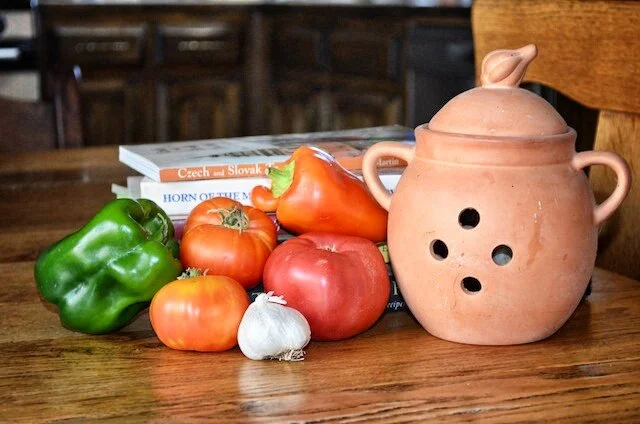Traveling the Side Roads
by Barbara Benjamin
People travel for many reasons: to get away from the routines of daily life; to face a new challenge, to see new sights, or just to kick back and relax. I travel to experience new cultures, to come away knowing what it is like, day by day, to live in a place I’ve never lived in before. So, when I travel, I always travel on the side roads. Rather than booking accommodations at a travel agent’s favorite resort or hotel, I often land in another country I’m visiting without reservations, and, speaking to the airport cab driver or questioning some locals I meet on the road, I find out where I can rent a house. Occasionally, I am able to find a house far away from the tourist areas that is advertised in my hometown newspaper or on the Internet, and I can book in advance.
Once I find my temporary new home, whether a cottage in the tropics of Jamaica, West Indies, or North Wales or a pre-Revolutionary farmhouse in Downeast, Maine, I begin my adventure of setting up my new household, shopping in the local markets, cooking the local meals, conversing with the local people, and attending the local church. Mingling with my new neighbors in this way, I often make friends and have the good fortune to be invited into their homes for lunch or afternoon tea. That’s when I really learn what it would be like to live in the place I’m visiting, as my new friends enthusiastically share stories about their lives, all the latest town gossip, and their secret recipes for national dishes. I should explain that, whenever possible, one of my first purchases is always a local cookbook, and I often learn more remarkable information about the people I am living among from their cookbooks than from all the history and guidebooks available.
Traveling this way, I always have a chance to observe the demographics of the culture, the rhythms and mores of diverse people in the region I’m visiting, and, unfortunately, the inescapable and ever-present antagonism that exists between different groups of people within a single culture and between cultures. No matter how majestic and serene the snow-capped peaks or how deep and placid the waters that mark the landscape, there is always an underlying tension between the diverse groups of people who live there. Like the tension created by the tectonic plates that rub against or move away from each other under the earth’s surface, the people in every culture rub against each other and move away from each other, often leading to violent social eruptions.
In Jamaica, West Indies, even before Democratic Socialist Michael Manley and his followers changed the political climate of that island nation, there were palpable tensions along the peaceful country lanes, where bearded Rastafarian men come down from the hills of the Blue Mountains to delight the children who gather around them to hear their fanciful stories. Here, where most of the native population reflects a breathtakingly beautiful blend of cultural and genetic variation, Chinese merchants and native Jamaicans hold harsh opnions of each other and communicate those opinions to anyone who will listen, even a stranger in their midst like me.
And across the Atlantic, in Europe, as I travel and live on the side roads and mingle with the local people so that they open up their hearts and really talk with me, I, again, find the same pervasive and entrenched hostility between different groups of people. This opposition within countries and between countries in Europe is particularly shocking to me because the countries are no further apart from each other than one state is from another in the United States where, going from Connecticut to New York or from Texas To Oklahoma, I encounter no more antagonism than hometown pride at a football game.
I was most startled by how deeply this opposition can be entrenched one crisp autumn afternoon while enjoying tea with my new friends, the Floyds, in their home in Llanrhaeadr, a small town in North Wales where the local butcher always has fresh sheep’s liver for sale, brought in daily from the surrounding hill farms. I was renting a cottage there for several weeks and was planning to leave the next day for Heathrow Airport to catch a plane home. Mrs. Floyd, who had just shared with me her secret recipe for scones, which included adding a tablespoon of shredded coconut, glanced cautiously at me and then at her husband, and boldly proclaimed that she would love to go to England because she had never been there. I didn’t know what to make of that, since we were only four miles away from the English border, and I wondered to myself, without daring to ask, how she was able to avoid going into England with the border so close. In response to his wife’s proclamation, Mr. Floyd, clearly perturbed, retorted, “No wife of mine will ever step foot in England if she expects to return to my home.”
A lifetime of traveling on the world’s side roads and always encountering this deeply-entrenched perception of “us” and “them” in every country convinced me that this was the underlying cause of most of the problems we face in our world, and it also convinced me that I had to try to do something about it. Since I am a writer and consultant, my first effort was to write a book, Christ Conscious Leadership, to help people develop a new consciousness of our unity with each other, a seamless unity that quantum physicists began discovering over a century ago. I can’t hope to change everyone’s embedded attitudes, but I may be able to make a small difference.
A consultant, educator, executive mentor, international retreat leader, and author, Barbara Benjamin is currently the director of the Center for Christ Conscious Leadership (www.cclcenter.com), which offers an online eight-week certificate course, Becoming a Christ Conscious Leader, individual consultations, and organizational consulting.
*photograph by Chris JL via flickr.com common license.

